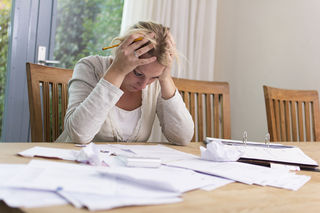
Stress
How to Tell if You’re Stressed or Depressed
If left unmanaged, stress can lead to depression.
Posted January 8, 2016

Feeling stressed out? You’re not alone. Seventy-two percent of adults surveyed by the American Psychological Association reported feeling stressed out at least some of the time during the past month.
Regardless of what you’re stressing about, stress can quickly turn into a problem when it builds and starts to cause wear and tear on your body—and your overall mental state. In fact, if left unmanaged stress can actually lead to depression.
Chronic stress leads to physical changes in your brain and body, changes in the way you’re thinking, and ultimately to changes in the way you’re behaving.
Stressed out people are more likely to engage in unhelpful and unhealthy behaviors like overeating, smoking, drinking, and dropping out of important activities like exercising and socializing. And all of this can increase the likelihood that your stress turns into depression.
So how can you tell if you’re just stressed out or are suffering from depression? Essentially the answer lies in the severity and the duration of your symptoms.
Feeling stressed out is usually associated with feeling overwhelmed or under pressure. As you know, I believe the term “stressed out” is a generalization we use to really just say that we’re having a hard time coping with distressing emotions such as fear or sadness.
These feelings can last for a couple of days (read about how to take charge of your emotions to manage stress here). However, when you don’t manage these emotions effectively they can transform from a single episode of feeling overwhelmed into a chronic mood that feels more severe and lasts longer. That’s when stress turns into depression.
Depression is more than just a passing bad mood. If you’ve been feeling some of the following symptoms for two weeks or more, you might be suffering from depression:
• Feeling sad and hopeless
• Lack of energy, enthusiasm and motivation
• Withdrawing from other people
• Trouble making decisions
• Feeling restless, agitated and irritable
• Eating more or less than usual
• Sleeping more or less than usual
• Trouble with concentration and memory
• Feeling bad about yourself or feeling guilty
• Feeling anger and rage
• Feeling that you can't overcome difficulties in your life
• Trouble functioning in your personal life
• Chronic physical symptoms (such as pain or stomach issues)
• Thoughts of death or suicide
Although depression is the most common mental health disorder in the US, it is treatable. However, most people can’t manage it alone.
If you or a loved one is suffering from depression, it’s important that you seek professional help. Ask your primary care physician for help finding a mental health professional in your area or look here for more resources.
if you’re depressed it can feel incredibly hard to take action and do anything to help you get better. The key is to start by taking small steps.
I’ve helped hundreds of patients overcome depression and the key to feeling less depressed is to get help. For more information on how to cope with depression, read this post.
To stay updated on Wise Mind Living visit erinolivo.com
Sign up for the WML newsletter here & receive a free guided meditation to reduce your stress in 3 minutes.
Like Erin on Facebook
Follow Erin on Twitter
© 2016, Erin Olivo, PhD

